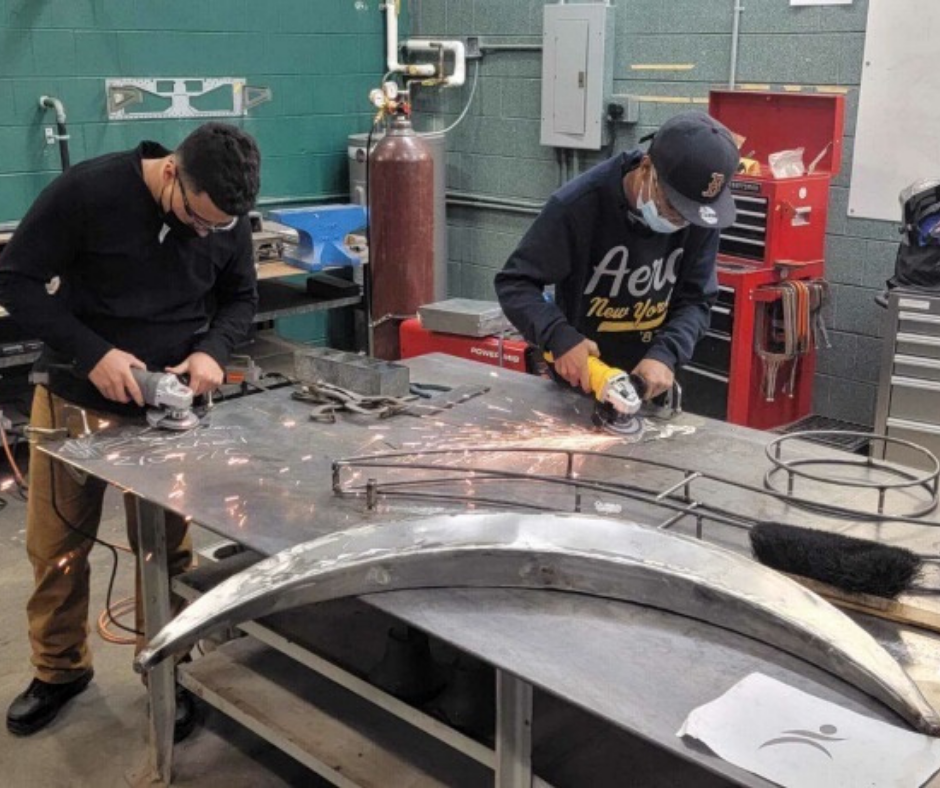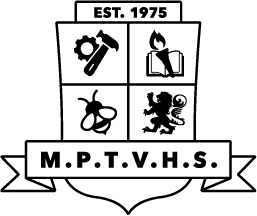
Career Vocational Technical Education
Madison Park Technical Vocational High School is Boston’s ONLY Career-Vocational Technical education (CVTE) high school. Madison Park offers 20 programs to choose from.
In the Freshmen year students will explore all programs and choose between Automotive Technology, Automotive Collision Repair and Refinishing, Dental Assisting, Medical Assisting or Health Assisting, as well as Cosmetology. There are also programs in Design and Visual Communications, Graphic Communications, Radio & Television Broadcasting, Information Support Service & Networking, Marketing, Programing and Web Development, Hospitality Management, Culinary Arts, Carpentry, Electricity, Building and Property Maintenance, Heating, Ventilation and Air Conditioning(HVAC), Plumbing and Metal Fabrication and Joining Technologies.
All students rotate their schedule every other week with one full week of academic courses and in the CVTE week Freshmen and Sophomores are in CVTE courses for ½ of the day and Juniors and Seniors are in CVTE courses the whole day every other week.
CVTE courses are designed to teach both background theory and knowledge as the foundation for project based skill development and hands on work. Dedicated students in the construction trades can join the local union for additional training and apprenticeships. Students who excel are eligible for Cooperative placements in their Senior year where they do not attend school during their CVTE week but go straight to a job site and get paid while learning from professionals in their industry. Additionally, all students are encouraged to join the dual enrollment programs with our higher education partners.
For more information, contact Vocational Directors Emily Medina at emedina@bostonpublicschools.org or Perino Watson at pwatston@bostonpublicschools.org.
CVTE Programs
Madison Park’s vocational programs are grouped into four clusters: Allied Health, Communication and Technology, Construction Trades and Human Services. Here are descriptions of each program.
Allied Health Cluster
Dental Assisting:
Students in Dental Assisting prepare for all aspects of work in dental offices and in outpatient dental clinics and labs. Students will learn proper chairside assisting, infection control and sterilization, mixing materials and radiation health and safety.
Health Assisting (Nursing):
Students in Health Assisting prepare for employment in either acute, long term care or home health care facilities. Students learn theory and practical applications and perform 40 hours of clinical experience. Students prepare for Certified Nursing Assisting and Home Health Aide credentials.
Medical Assisting:
Students in Medical Assisting learn the fundamental principles of a medical facility, patient care, as well as the skills needed to assist professionals in the clinical environment. Students learn to measure vital signs, collect lab specimens, assist physical exams and maintain medical records. Students learn office management, computer, and technology skills. The students have the opportunity to practice those authentic skills in hospitals/clinics.
Communications and Technology Cluster
Design and Visual Communications:
Students in Design and Visual Communication are trained to become professional artists and designers. The curriculum includes the elements and principles of art and design, fine art and perspective drawing, graphic design. Creative and conceptual problem-solving projects teach students to resolve visual communication needs and how to prepare creative art for reproduction.
Graphic Communications:
Students in Graphic Communications receive training in all aspects of digital printing. Students acquire a comprehensive foundation of the necessary skills and techniques for designing and producing digitally generated print materials such as: brochures, invitations, business cards, large format posters and banners, vinyl signs, and customized t-shirts.
Information Support Services & Networking (ISSN):
Students in Information Support Services and Networking will learn parts and equipment for computers and to assemble, install, operate, maintain and repair computers and related equipment. They will manage and configure network equipment, troubleshoot and learn customer service.
Marketing and Business Technology:
Students in Marketing and Business Technology receive training in marketing and business and all aspects of corporate accounting and entrepreneurship. Students join the DECA national competition and attend field trips when competing.
Media Arts:
Students in Media Arts are trained in communication arts through the use of video and audio machines, portable production equipment, and cameras. Students write scripts, edit tapes, and produce their own productions.
Programming and Web Development:
Students in Programming and Web Development learn to plan, design, update and manage computer software and systems through software programming and development. Students will learn about careers in this field and be responsible for the creation and production of interactive media, including digital and multimedia products.
Construction Trades Cluster
Carpentry:
Students in Carpentry plan, design and build structures fabricated from various building materials, especially wood. They learn to use all building and construction equipment and tools. Students have the opportunity to work outside of school starting Junior year in established mentoring programs.
Electricity:
Students in Electricity will learn safety and the theory of electrical technology. They will apply skills by working with electrical fixtures, wiring, heating and power systems; install switches, conduits, controls and circuit breakers.
Facilities Management:
Students in Facilities Management focus on building upkeep and repair of apartments, companies, hospitals or educational institutions. Tasks and skills are related to carpentry, electricity, plumbing, painting, wallpapering, landscaping and maintenance services.
Heating, Ventilation, and Air Conditioning (HVAC):
Students in Heating, Ventilation, and Air Conditioning learn to install and maintain heating and cooling systems for residential homes, schools, hospitals, offices, restaurants, and factories. There is substantial instruction in electrical theory, the physics of heat and fluids, formulas for heat load calculations, as well as basic design and engineering of heating and cooling systems.
Metal Fabrication & Joining Technologies:
Students in Metal Fabrication and Joining Technologies learn that welding is an important part of fastening metal components together. Students receive extensive training in the various methods of welding, e.g. oxyacetylene cutting, electric arc, M.I.G. / T.I.G. and hand-held plasma cutting.
Plumbing:
Students in Plumbing learn all aspects of the plumbing industry including pipe threading, soldering, drains, vent and waste piping, plumbing fixtures, water and hydronic heating systems and assembling complete plumbing systems.
Human Services Cluster
Cosmetology:
Students in Cosmetology learn all aspects of hair styling, manicuring, skin care and professional ethics. Students have the opportunity to receive 1000 classroom hours needed for state licensure.
Culinary Arts:
Students in Culinary Arts learn basic food handling and preparation skills including catering, baking, menu planning, inventory control and safety techniques in order to work in any size restaurant kitchen, event facilities kitchen, or privately owned food service company
Hospitality Management:
Students in Hospitality Management learn all aspects of event planning, hotel operations, and food & beverage management. They receive customer service training for the travel, tourism, food & beverage and full service hotel industries. There is an emphasis on managing all aspects of service and supervision.
Transportation Cluster
Automotive Technology:
Students in Automotive Technology learn about automobile operating systems, diagnose problems, and replace and repair parts in an engine and other systems in a car, truck, boat or small transport vehicles.
Automotive Collision Repair and Refinishing:
Students in Automotive Collision Repair and Refinishing learn automobile construction and collision repair techniques for repairing the outside of cars, trucks, etc. They also learn to investigate, analyze and estimate automotive repairs and customer service management.
